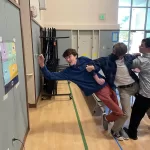This is a HUGE way to support your child’s team!
One of the most important volunteer opportunities that OM has to offer is being a judge or an official. Officials are the faces of Odyssey of the Mind that teams will remember about their experience. So make it memorable and HAVE FUN as you get an insider’s view of OM teams and their creativity!
If you are a parent/guardian of a team member, you might be disappointed that you won’t be able to see your child perform at the tournament, BUT you will see other teams perform and you will be AMAZED by their creativity!
And if your child’s team forgets to say it…THANK YOU for volunteering to be a judge and representing the team! This is a HUGE way to support your child’s team!
What’s Involved?
Every team is required to provide one judge at the same Qualifying Tournament that they attend. If that team advances, that same trained judge needs to represent the team again at the NorCal State Tournament. Because long-distance traveling is involved to get to one or both of these tournaments, it can be convenient if the judge is a parent/guardian of the team. If the judge is a parent/guardian of a team member, they will be assigned to judge a different problem than their child’s team to ensure unbiased judging. Hopefully, another parent/guardian of the team can record the performance and share it with you.
Registration
Judges must register individually so that the contact information is correct. The coach should send the link to register as a judge soon AFTER they register for one of the Qualifying Tournaments. The judge needs to know which qualifying tournament, their team’s membership name & number, the coach’s name & email, and which problem the team they represent is solving. The NorCal website will also have links and information about judging HERE.
Training
All judges must be trained by the Problem Captain of the problem to which they are assigned. After registering, they will be sent the link to complete the online modules prior to the live webinar training, and the date and time of the live webinar training (in January).
Availability on Tournament Day Judging at the tournament is a full-day commitment. Judges need to arrive before the first team that they will be judging (as early as 7-8 am) and stay about 30 minutes after the last team finishes (as late as 5-6 pm). Food and breaks will be provided.
Teamwork
Judges are part of a judging team. They need to work together as a team and do their part to be positive, fair, and punctual the entire day to the best of their ability. Click HERE for the different types of judging positions available.
What makes a GREAT OM Judge?
Be Positive! Smile, laugh, wear a silly hat or button that will make the team smile. Enjoy seeing creativity through different age divisions. Write something positive on a post-it note for every team, no matter how they did.
Be Knowledgeable! Know the problem that you are judging and fulfill the responsibilities of your judging position to the best of your ability. Be prepared for what you will do if the team does not complete every part of the problem. Some teams will have read the full long-term problem far more times than you and will complete every task. Others will appear to have only read the synopsis and have no idea there were other specific required elements. The same differences can be seen in the Spontaneous problem. Your number score will tell the team where they need to improve. Stay positive when talking with the team no matter how well they solved the problem.
Be Fair! Do not tell the team how they compared to other teams you’ve seen that day. Let your number scores tell the team what they did well and where they need to improve. Award as many points as you feel they earned for each element. Penalties and scores of 0 are sometimes awarded when teams didn’t complete required elements, admit to receiving outside assistance, or break a rule described in the Program Guide or the problem. These are discussed together as a judging team AFTER speaking with and dismissing the team. The Head Judge will discuss and explain the scores and any penalties with the coach privately.
Be a Good Listener! For Long-Term Judges, get up and talk with the team after their performance. Ask questions about the elements you are scoring and listen carefully as team members tell you about their ideas. Ask questions about the team’s journey (What part of the problem did your team have the hardest time solving?). For teams with incomplete solutions, ask what they would have done if they had more time. You can only give points for what you saw during the performance, but this gives the team the chance to share their ideas. For Spontaneous Judges, the team only receives points for what you see and hear while they are responding, so listen carefully!
Be Punctual! The tournament schedule is very tight. Teams have the long-term performance and a spontaneous problem to solve. We want teams to present solutions at their scheduled time. Don’t take too long talking with teams, giving scores, or writing positive comments. For complicated matters involving penalties, the judging team should wait until a break time and clear the room to discuss the matter(s) privately. ARRIVE to the tournament on time! And don’t make plans to leave early.
Be Encouraging! Most teams that you will see have worked for months creating the solutions they present (either the long-term problem or practicing for the spontaneous problem).
Be sure to thank them for sharing their hard work with you!






